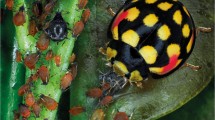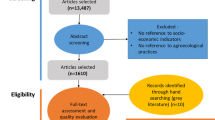Abstract
Pesticides remain an integral part of development efforts to renew economic growth in Central America and lift the region out of a severe economic crisis. This paper analyzes the implications of the continued reliance on pesticides for heightening economic and ecological problems in the agrarian sector.
Relying on a case study of export melon production in Choluteca, Honduras, the author argues that current development strategies, which rely heavily on pesticides, are generating ecological disruption that creates conditions biased against small producers. Lack of knowledge of the hazards inherent in the technology and the resulting emergence of pesticide resistant pests, crop losses, environmental contamination, and public health problems, pose serious obstacles to the survival of small-scale producers. Meanwhile transnational and other flexible, large scale operations often adapt to such conditions, and on occasion may even turn such problems to their benefit. The author concludes that economic growth may only be sustainable when questions of social equity and ecological viability are brought to the forefront of U.S. development strategies.
Similar content being viewed by others
References
Barry, Tom.Roots of Rebellion: Land and Hunger in Central America. Boston: South End Press, 1987.
Berman, Daniel M.Death on the Job: Occupational Health and Safety Struggles in the United States. NY: Monthly Review Press, 1978.
Boyer, Jefferson. “From Peasant ‘Economía’ to Capitalist Social Relations in Southern Honduras.”South Eastern Latin Americanist, 27 (4):1–22, 1984.
Boyer, Jefferson. “Capitalism, Campesinos and Calories in Southern Honduras,” in (ed.) Rollwagen, Jack.Directionsin Anthropological Study of Latin America: A Reassessment. Albany, New York: State University of New York Press, 1987.
Booth, John A., and Thomas W. Walker,Understanding Central America. Boulder, Colo.: Westview Press, 1989.
Brockett, Charles D.Land, Power, and Poverty: Agrarian Transformation and Political Conflict in Central America. Boston: Unwyn Hyman, 1988.
Bueso, José Antonio, Catherine Castañeda, Flora Duarte, and Miriam O. Chavez.Efectos de Plaguicidas en Honduras. Tegucigalpa: Universidad Nacional Autónoma de Honduras, 1987.
Bulmer-Thomas, Victor.The Political Economy of Central America Since 1920. Cambridge: Cambridge University Press, 1987.
Bymes, Kerry J. “From Melon Patch to Market Place: How They Learned to Export a Non-Traditional Crop.” Paper prepared for the AID/LAC/CDIE Trade and Investment Workshop, Alexandria, Virginia, November 13–14, 1989.
CEPAL (Centro Económico Para America Latina)Centroamerica: Crisis Agrícolay Perspectivas de un Nuevo Dinamismo. Mexico: February 12, 1986.
Cleaver, Harry M.The Origins of the Green Revolution. Stanford: Unpublished doctoral dissertation, 1974.
Conroy, Michael E. “The Diversification of Central American Exports: Chimera or Reality?” Paper presented at the XV International Congress of the Latin American Studies Association, Miami, Florida; December 4–6, 1989.
Contreras, Mario.Situation, Perspective and Strategies for the Use of Pesticides in Central America. Guatemala: Regional Office for Central American Programs (ROCAP), March, 1990.
DeWalt, Billie. “Microcosmic and Macrocosmic Processes of Agrarian Change in Southern Honduras: The Cattle Are Eating the Forest.” In Billie R. DeWalt and Pertti J. Pelto, eds.,Micro and Macro Levels of Analysis in Anthropology: Issues in Theory and Research. Boulder, Colo.: Westview Press, 1985.
Durham, William.Scarcity and Survival in Central America: The Ecological Origins of the Soccer War. Stanford, Calif.: Stanford University Press, 1979.
Epstein, Samuel.The Politics of Cancer. New York: Anchor Books. 1979.
FAO (Food and Agriculture Organization of the United Nations).Centroamerica: Estudio Regional del Algodón. Rome: December 6, 1990.
FPX (Federación de Productores y Exportadores Agropecuarios y Agroindustriales de Honduras).Plan de Desarrollo de Producto: Melón, 1990/1991. San Pedro Sula: June, 1990.
Glover, D. and Kusterer, K.Small Farmers, Big Business: Contract Farming and Rural Development. New York: St. Martin's Press, 1990.
Jarvis,LovellS. “Chilean Fruit Development Since 1973: Manipulating the Cornucopia to What End?” Paper presented at the XVI International Congress of the Latin American Studies Association, April 4–6, 1991, Washington, D.C.
Keifer, Matthew C. and Feliciano Pacheco.Reporte de Encuesta de Subregistro de Intoxicaciones con Plaguicidas Sobre el A:o 1989, Region II, León, Nicaragua. Managua: CARE Nicaragua, 1991.
Kissinger, Henry.Report of the National Bipartisan Commission on Central America. Wash., D.C.: Govt. Printing Office, 1984.
Lack, Stephen, C. Kenneth Laurent, Conchita Espinoza, Arden Christiansen, and Donald Calvert, “Agricultural Crop Diversification/Export Promotion: Cross-cutting Evaluation (Draft Evaluation Report). Washington, D.C.: Experience Inc., USAID Contract No. AID/PDC-1406-I-7011-00, Delivery Order No. 16, October 14, 1988.
Leonard, H. Jeffrey. Natural Resources and Economic Developmentin Central America. New Brunswick: Transaction Books, 1987.
Levine, R.S.Informal Consultation on Planning Strategy for the Prevention of Pesticide Poisoning, unpublished document. Geneva: World Health Organization, November 25–29, 1985.
López, José Gabriel.Agrarian Transformation and the Political, Ideological and Cultural Responses from the Base: A Case Study from Western Mexico. University of Texas, Austin: Unpublished Ph.D. dissertation, 1990.
Marenco, Roberto. “Informe Preliminar de Actividades del Departmento de Protección Vegetal de la Escuela Agrícola Panamericana en el Programa de Manejo Integrado de Plagas de Cucurbitas en el Sur de Honduras.” Zamorano, Honduras: Escuela Agrícola Panamericana, 1990.
McCamant, John F.Development Assistance in Central America. New York: Frederick A. Praeger, 1968.
McConnell, Rob, Feliciano Pacheco A., Nestor Castro G., and Matthew Keifer. “Poisoning Epidemics and Preventative Health Care.”Global Pesticide Monitor, Vol. 1, no. 2:10–11, 1990.
Murray, Douglas L., and Polly Hoppin. “Recurring Contradictions in Agrarian Development: Pesticide Problems in Caribbean Basin Nontraditional Agriculture.” (forthcoming)World Development, April, 1992.
The Packer. “Pretto Lures U.S. Melon Business.” March 10, 1990:A4.
Parsons, Kenneth H., “Agrarian Reform in Southern Honduras,” Madison: University of Wisconsin Land Tenure Center, Research Paper No. 67, 1976.
Pearse, Andrew C.Seeds of Plenty, Seeds of Want. Oxford: Clarendon Press, 1980.
Perdomo, Rodulio, and Hugo Noe-Pino. Impacto de las Politicas de Fomento a las Exportaciones No Tradicionales Sobre Pequeños y Medianos Productores: Caso del Cultivo del Melóny Camaron, Primer Borrador. Tegucigalpa: Postgrado Centroamericano en Economía y Planificación de Desarrollo, 1991.
Raynolds, Laura T. “Export Substitution and the Rise of Non-Traditional Agricultural Commodities in the Dominican Republic.” Paper presented at the Latin American Studies Association, XVI International Congress, April 4–6, 1991, Washington, D.C.
Rosset, Peter M., “Economies of Scale and Social Instability: Achilles Heel of Non-Traditional Export Agriculture?” A Proposal to the John D. and Catherine T. MacArthur Foundation; Managua: Tropical Center for Agricultural Research and Training (CATIE), 1991.
Simón, Jorge J., Rolando Martínez, Maritza Vargas, Mauro Paniagua, Nestor Jirón, Julio Bohorquez, and Peter Rosset. “Diagnóstico de factores que incidieron en el rendimiento del algodón el en ciclo 89/90 en la Región Occidental de Nicaragua.” Paper presented at the 4th National Congress for Integrated Pest Management, October 23–26, 1990, Managua, Nicaragua.
Smith, Ray F., and Harold T. Reynolds. "Effects of Manipulation of Cotton Agro-Ecosystems on Insect Populations," in (eds.) M. Taghi Farvar and John P. Milton,The Careless Technology: Ecology and International Development. Garden City, New York: The Natural History Press.
Stanford, Lois. “‘Privatization’ ofMexican Agriculture: The Impact on Peasant Organizations.” Paper presented at the Latin American Studies Association Meetings, Washington, D.C., April 4–6, 1991.
Stonich, Susan C. “The Dynamics of Social Processes and Environmental Destruction: A Central American Case Study.”Population and Development Review, vol. 15, no. 2:269–296, 1989.
Stonich, Susan C. “Struggling with Honduran Poverty: The Environmental Consequences of Natural Resource Based Development and Rural Transformations.” University of California, Santa Barbara: Unpublished manuscript, 1990.
Swezey, Sean L., Douglas L. Murray, and Rainer G.Daxl. “Nicaragua's Revolution in Pesticide Policy.”Environment, vol. 28, no.1:6–9, 29–36, 1986.
Tabora, Panfilo. Evaluación de veinticinco cultivos con perspectivas en Honduras. La Lima, Honduras: Fundación Hondureña de Investigación Agrícola, 1990.
USAID Honduras (United States Agency for International Development).Agricultural Sector Strategy Paper. Tegucigalpa: Office of Agriculture and Rural Development, February, 1990.
USDA (United States Department of Agriculture). “Volume of Central American Produce Exports to U.S.”USDA Summary Report Fresh Fruit and Vegetable Shipment. Washington, D.C., 1990.
Van den Bosch, Robert.The Pesticide Conspiracy. New York: Anchor Books, 1980.
White, Robert.Structural Factors in Rural Development:The Church and Peasant in Honduras. Cornell University: Unpublished Ph.D. dissertation, 1977.
Williams, Robert G.Export Agriculture and the Crisis in Central America. Chapel Hill: University of North Carolina Press, 1986.
Personal Interviews and Communications
Andrews, Keith L. Department Chief, Departamento de Protección Vegetal, Escuela Agrícola Panamericana, El Zamorano.
Avila, Justo Pastor. Chief of Technical Department, Cooperativa Agropecuaria Algodonera del Sur, Tegucigalpa.
Coto, Jesus. Production Manager, Patsa, Choluteca.
Garcelon, George. Technical Advisor, AID, Tegucigalpa.
Garza, Freddy. Inspector, Ministry of Natural Resources, Choluteca.
Guevara, Irene. Agricultural Economist, National Autonomous University of Nicaragua.
Guevara, José Benito, Director, Crehsul, Choluteca.
Lastres, Lorena, Entomologist, Departamento de Protección Vegetal, Escuela Agrícola Panamericana, El Zamorano.
Ostmark, Eugene. Former ChiefEntomologist, United Fruit Company of Honduras, La Lima.
Pretto, Rolando. Former Director, Melon Exporters Association of Honduras, Choluteca.
Salgado, Toms. Chief, Pesticide Analysis Laboratory, Fundación Hondureño para Investigación Agrícola, La Lima.
Tabora, Panfilo. Agricultural Economist, Fundación Hondureño para Investigación Agrícola, La Lima.
Turcio, Marcio. Agronomist, Crehsul, Choluteca.
Additional information
1. The author acknowledges the generous support of the John D. and Catherine T. MacArthur Foundation, Program for Peace and International Cooperation. Funding was also provided for field research on this article by the Fulbright Program, Central American Republics Research Program. Helpful comments on various drafts were offered by Michael Conroy, Brad Barham, Peter Rosset, David Kaimowitz, Jefferson Boyer, and Lorena Lastres.
Douglas L. Murray is a Visiting Scholar and Research Associate at the Center for Latin American Studies, Stanford University. He has worked on pesticide-related health, environmental and production problems in Latin America for over a decade, and is currently writing a book:Cultivating Crisis: Pesticides and the Development of Latin America.
Rights and permissions
About this article
Cite this article
Murray, D.L. Export agriculture, ecological disruption, and social inequity: Some effect of pesticides in Southern Honduras. Agric Hum Values 8, 19–29 (1991). https://doi.org/10.1007/BF01530651
Issue Date:
DOI: https://doi.org/10.1007/BF01530651




